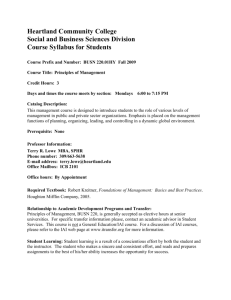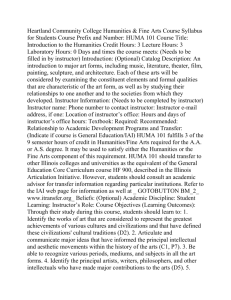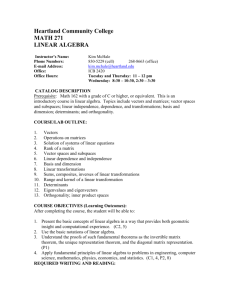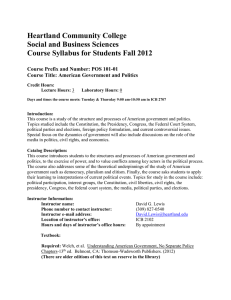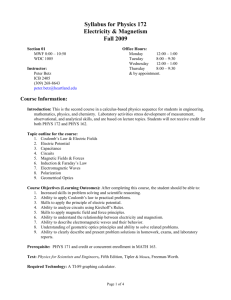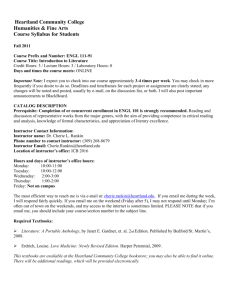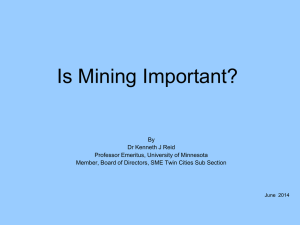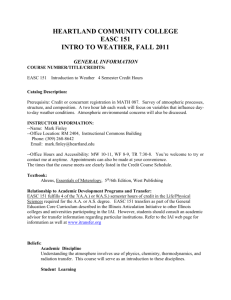CNST 101 Fall 2009_Rich Foley
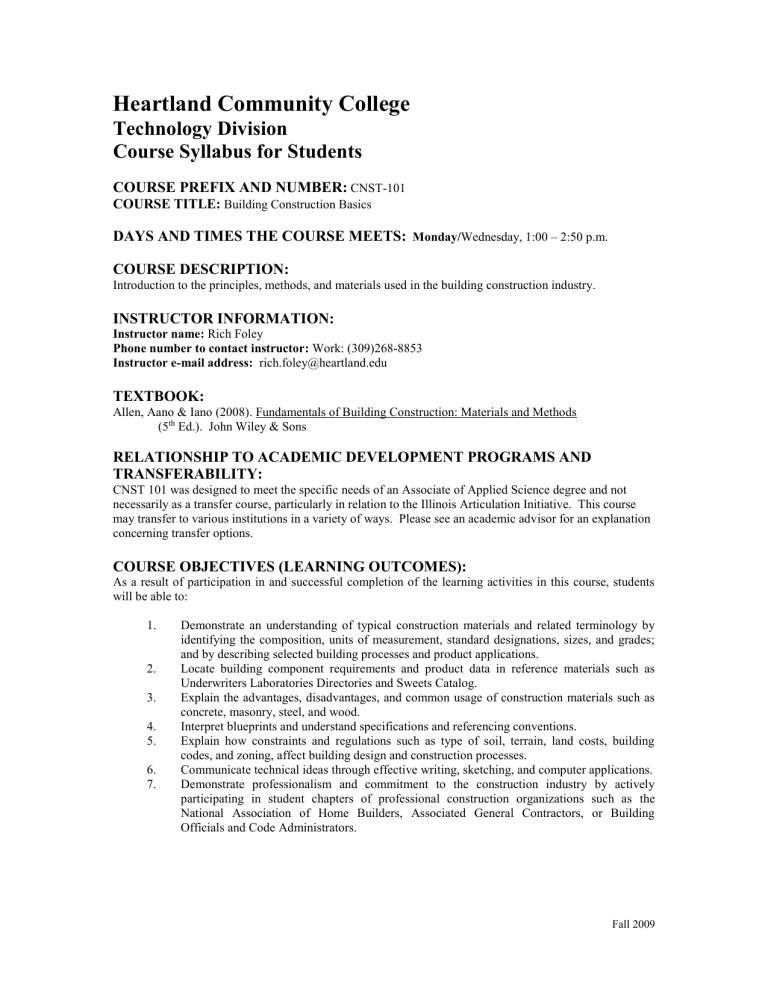
Heartland Community College
Technology Division
Course Syllabus for Students
COURSE PREFIX AND NUMBER:
CNST-101
COURSE TITLE:
Building Construction Basics
DAYS AND TIMES THE COURSE MEETS:
Monday/ Wednesday, 1:00 – 2:50 p.m.
COURSE DESCRIPTION:
Introduction to the principles, methods, and materials used in the building construction industry.
INSTRUCTOR INFORMATION:
Instructor name: Rich Foley
Phone number to contact instructor: Work: (309)268-8853
Instructor e-mail address: rich.foley@heartland.edu
TEXTBOOK:
Allen, Aano & Iano (2008). Fundamentals of Building Construction: Materials and Methods
(5 th Ed.). John Wiley & Sons
RELATIONSHIP TO ACADEMIC DEVELOPMENT PROGRAMS AND
TRANSFERABILITY:
CNST 101 was designed to meet the specific needs of an Associate of Applied Science degree and not necessarily as a transfer course, particularly in relation to the Illinois Articulation Initiative. This course may transfer to various institutions in a variety of ways. Please see an academic advisor for an explanation concerning transfer options.
COURSE OBJECTIVES (LEARNING OUTCOMES):
As a result of participation in and successful completion of the learning activities in this course, students will be able to:
1. Demonstrate an understanding of typical construction materials and related terminology by identifying the composition, units of measurement, standard designations, sizes, and grades; and by describing selected building processes and product applications.
2. Locate building component requirements and product data in reference materials such as
Underwriters Laboratories Directories and Sweets Catalog.
3. Explain the advantages, disadvantages, and common usage of construction materials such as concrete, masonry, steel, and wood.
4. Interpret blueprints and understand specifications and referencing conventions.
5. Explain how constraints and regulations such as type of soil, terrain, land costs, building codes, and zoning, affect building design and construction processes.
6. Communicate technical ideas through effective writing, sketching, and computer applications.
7. Demonstrate professionalism and commitment to the construction industry by actively participating in student chapters of professional construction organizations such as the
National Association of Home Builders, Associated General Contractors, or Building
Officials and Code Administrators.
Fall 2009
COURSE OUTLINE:
1. Design considerations
•
•
Zoning
Building codes
•
•
•
•
Occupational Safety and Health
Other legal constraints
Information resources (UL, ASTM, ANSI)
Construction Standards Institute CSI Master Format
2. Foundations
•
•
Foundation loads and settlement
Soils, excavation, slope support
•
•
•
•
•
Waterproofing and drainage
Designing foundations
Shallow foundations
Deep foundations
Waterproofing and drainage
3. Wood products
•
Lumber
•
•
•
•
Manufactured wood products
Characteristics of wood
Wood treatment
Fasteners
4. Light frame construction
•
•
•
•
•
History
Balloon and platform framing
Frame components and layout of floors, walls, stairs, and roofs
Building codes
Energy efficiency & alternative methods
5. Exterior finish systems
•
•
•
•
•
•
Light frame & commercial cladding
Roofing
Windows
Siding
Curtain walls
Exterior finishes
6. Interior finishes
•
•
•
•
•
•
Sequence of int. fin.operations
Thermal insulation and vapor barriers
Walls and partitions
Ceiling finishes
Flooring and ceramic tile
Millwork and finish carpentry
7. Masonry
•
•
•
•
•
•
Bricks
Concrete masonry units
Mortar
Bearing walls
Waterproofing
Crack control
Fall 2009
8. Steel frame construction
•
Cast iron vs. steel
•
•
•
•
•
•
Steel manufacturing
Steel nomenclature
Details of steel framing
Methods of bracing and lateral reinforcement
Fireproofing of steel framing
Light-frame steel
9. Concrete construction
•
•
•
•
•
Cement and concrete
Formwork and reinforcement
Placing concrete
Prestressed reinforcement
Sitecast concrete systems
COURSE POLICIES:
METHOD OF EVALUATION (Tests/Exams, Grading System):
Examinations
Quizzes
Assignments/projects
TOTAL
Grades
100-90% = A
89-80% = B
70 - 79% = C
69 - 60% = D
Below 60% = F
60%
20%
20%
100%
Participation (or Attendance)
Students are expected to attend all classes and participate meaningfully in the activities each class day .
Incompletes
An incomplete grade may be given to a student who, by the withdrawal date, can reasonably be expected to pass the course. Incompletes may be granted only when justified by extreme circumstances (e.g., serious illness, accident, death or serious illness in the immediate family). Incomplete grades are not given for such reasons as unjustified failure to appear for the final examination. A written agreement, outline the requirements to be met, must be signed by the instructor and the student. The agreed upon requirements must be completed no later than the end of the following semester (spring semester for incompletes granted during the fall, and the following fall for incompletes given during the spring and summer semesters). By the agreed upon date, the instructor will assign a grade or the incomplete will be changed to an ‘F’ if the requirements are not completed.
MISSING AN EXAM AND ASSIGNMENTS POLICY:
The student’s grade will be based on multiple measures of performance. The assessment will measure development of independent critical thinking skills and will include evaluation of the students ability to perform the outlined course objectives.
Students are expected to attend all classes and participate meaningfully in the activities each class day.
Excessive absences may result in the student being dropped from the class.
Fall 2009
If a class period is missed, it is the responsibility of the student to obtain any materials or notes they missed.
No assignments will be accepted after the cutoff date
No exams may be taken after the last availability date of that exam. Exams may be offered on multiple or on single days. Once the availability date of the exam has passed, the exam may not be taken and the score for the exam will be zero..
REQUIRED WRITING AND READING:
Textbook
Articles and other materials as assigned
ACADEMIC INTEGRITY
Academic integrity is a fundamental principle of collegial life at Heartland Community College and is essential to the credibility of the College’s educational programs. Moreover, because grading may be competitive, students who misrepresent their academic work violate the right of their fellow students. The
College, therefore, views any act of academic dishonest as a serious offense requiring disciplinary measures, including course failure, suspension, and even expulsion from the College. In addition, an act of academic dishonesty may have unforeseen effects far beyond any officially imposed penalties.
Violations of academic integrity include, but are not limited to cheating, aiding or suborning cheating or other acts of academic dishonesty, plagiarism, misrepresentation of data, falsification of academic records or documents and unauthorized access to computerized academic or administrative records or systems.
Definitions of these violations may be found in the college catalog.
PLAGIARISM
Plagiarism is the presenting of others’ ideas as if they were your own. When you write a paper, create a project, do a presentation or create anything original, it is assumed that all the work, except for that which is attributed to another author or creator, is your own. Plagiarism is considered a serious academic offense and may take the following forms:
Copying word-for-word from another source and not giving that source credit.
Paraphrasing the work of another and not giving that source credit.
Adopting a particularly apt phrase as your own.
Using an image or a copy of an image without crediting its source.
Paraphrasing someone else’s line of thinking in the development of a topic as if it were your own.
Receiving excessive help from a friend or elsewhere, or using another project as if it were your own.
[Adapted from the Modern Language Association’s MLA Handbook for Writers of Research Papers. New
York: MLA, 1995: 26]
Word-for-word copying is not the only form of plagiarism. The penalties for plagiarism may be severe, ranging from failure on the particular piece of work, failure in the course or expulsion from school in extreme cases.
Many plagiarism problems can be remedied by citing the sources of the original work. When in doubt, cite the source according to the style your instructor directs. Usually this is APA or MLA Style. Don’t be daunted by citing sources which are not books. You can cite everything – including pamphlets, maps, cereal boxes, telephone conversations, movies, television shows, Internet and world-wide web sites.
Most cases of plagiarism arise from carelessness or haste. Violators often attempt to excuse themselves by saying that they were not told of the nature of plagiarism. You have been told. You must not include either
Fall 2009
the phrases or ideas of another writer in your papers without acknowledgment. Otherwise, you are stealing.
Plagiarism is dishonest. It is cheating and is subject to severe penalties. It may endanger your whole career. Don’t do it.
ACADEMIC SUPPORT SERVICES:
Library
The Library, located in the Student Commons Buildings at the Raab Road campus, provides
Heartland students with a full range of resources including books, online journal databases, videos, newspapers, periodicals, reserves, and interlibrary loan. Librarians are available to assist in locating information. For more information, please call the Library (309) 268-8200 or (309)
268-8292
Tutoring Services
Heartland Community College offers tutoring in various forms at no cost to Heartland students at the Tutoring and Testing Center in Normal and at the Pontiac and Lincoln Centers. Tutors are available at convenient times throughout the week. Study groups are also available by request.
For more information about services available at each location, please call the Tutoring and
Testing Center in Normal (309) at 268-8231, the Pontiac Center at (815) 842-6777, or the Lincoln
Center at (217) 735-1731.
Testing Services
The Tutoring and Testing Center provides a secure testing environment for students who are enrolled in online, hybrid, and other distance learning courses; have a documented disability; or need to take a make-up exam. Testing accommodations for students having documented disabilities must be arranged by the student through the Office of Disability Services, and Testing
Services will only administer make-up exams at the request of the instructor. Contact Testing
Services at (309) 268-8231 for more information.
Fall 2009
